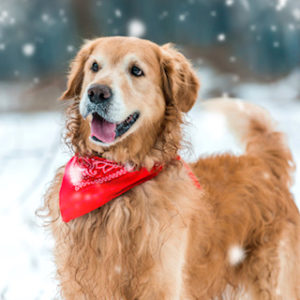
Gastric dilatation and volvulus (GDV) is a deadly condition most prevalent in large, deep-chested dogs.
Gastric dilatation and volvulus (GDV) is a deadly condition most prevalent in large, deep-chested dogs. When GDV occurs, the stomach fills with gas, causing gastric dilatation or “bloat” in its early stages. Sometimes, the condition does not go beyond a bloat. However, a GDV becomes a volvulus when the dog’s gas-filled tummy twists upon itself. This causes the stomach to become completely blocked at the entrance and exit. This is also a life-threatening health condition that requires urgent surgery to correct.
Causes of GDV
The exact cause of GDV is unknown. There are many theories regarding what could be contributing factors, but ultimately the true cause is still uncertain. Exercise after ingestion of large amounts of water or large meals might increase the risk of GDV. Stress or high anxiety may also be a contributing factor to GDV. Plus, illnesses that reduce intestinal motion can lead to stomach dilation and, eventually, volvulus.
Moreover, large dogs often experience GDV, especially those with deep chests. This definitely involves (but is not limited to) Great Danes, German Shepherds, Irish Wolfhounds, and Standard Poodles. Immediate veterinary attention (minutes to a few hours) is necessary to save your dog’s life.
How to Treat Bloat or GDV?
Bloat or GDV is an immediate and life-threatening emergency that requires direct veterinary intervention. We will immediately perform radiographs on your dog to definitively determine whether your dog has experienced GDV or not. Your dog will be given IV fluids right away to stabilize him or her and help with any shock they may be experiencing. It is crucial to reduce the pressure on the stomach wall and internal organs as soon as possible. If the stomach has not twisted, we might be able to pass a stomach tube. This would help remove the built-up air and relieve the pressure on the stomach. If the stomach has twisted and GDV has developed, the only way to correct it and save your dog’s life is to perform emergency surgery.
How is the Surgery Completed, and What is the Survival Rate?
The main purposes of the surgery are to return the stomach to its normal position, eliminate any necrotic tissue, and help prevent future GDV. The doctor will decompress the stomach initially and assess any damage to the organs. If there is necrotic (dead or dying) tissue present, the doctor will remove that. The doctor then will perform a gastropexy, commonly known as “stomach tacking.” This involves the doctor suturing the stomach to the body wall to fix the stomach in position and prevent future twisting. Sometimes we have to remove the spleen if it has significant damage to the twisted and bloated stomach.
There are many factors associated with the survival rate of a dog with GDV. It depends on how long the dog has had GDV, the severity of the condition, and organ damage, the degree of shock, and any cardiac issues that may have developed as a result of the condition.
Can GDV be Prevented?
Gastropexy is the most effective way of prevention. We may recommend completing prophylactic (preventative) gastropexy at the time of spay or neuter in high-risk breeds. We will review the risks and benefits of prophylactic gastropexy with you when discussing spaying or neutering your pet. Also, we will develop a plan that best fits your dog’s needs. Remember that gastropexy does not prevent bloat (dilatation) but does prevent twisting (volvulus) in most cases. Also, careful attention to diet, feeding, and continuous exercise routines might assist prevent gastric dilatation.
Here at Mount Carmel Animal Hospital, We’ll Treat Your Pets Like Family!
Mount Carmel Animal Hospital has been serving the Northern Baltimore/Southern York community for over 30 years and is proud to be an independently operated, small animal practice committed to excellence in veterinary medicine and client service. From grooming to wellness services, along with Canine Life Skills Training Courses, and surgical procedures, we have the expertise that will best serve the needs of you and your pet. Contact us at 410-343-0200 and follow us on Facebook!
